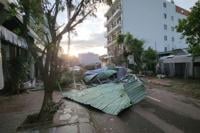WASHINGTON (AP) — Near the end of his first term, President Donald Trump signed into law a bill that aimed to reduce harmful, planet-warming p…
FILE - President of the Russian Academy of Sciences Vladimir Fortov, right, returns a Nobel prize medal which was sold at auction to a Russian businessman, to U.S. Nobel laureate, biologist James Watson in the Russian Academy of Sciences, in Moscow, Russia, Wednesday, June 17, 2015. (AP Photo/Ivan Sekretarev, File)
The U.S. government shutdown has rattled air travel — most recently with an unprecedented effort from the Federal Aviation Administration to cut flights by 10% at airports nationwide. And the disruptions are causing some to instead hit the road or buy a train ticket. That could mean more and more business for car rentals, long-haul buses and commuter rails like Amtrak — particularly if flight delays and cancellations continue piling up as the U.S. approaches Thanksgiving and other peak holiday travel. Amid the latest scramble, Hertz is already reporting a sharp increase in one-way car rentals. Meanwhile, Both Amtrak and Greyhound owner Flix North America are also preparing for potential growing demand.
A new bill introduced in the Delaware House of Representatives could alter how businesses and individuals deduct expenses on their state tax returns by breaking with recent federal tax changes.
The Federal Aviation Administration's order to scale back flights nationwide because of the government shutdown starts Friday. Flights at 40 major airports including in New York, Los Angeles and Chicago will be cut. The FAA says its goal is to reduce flights by up to 10% to ease pressure on unpaid air traffic controllers. Hundreds scheduled for Friday already have been canceled. The impact is expected to be felt across the U.S. air transportation system, affecting both passengers and package deliveries.
Travelers stand in line at a security checkpoint at George Bush Intercontinental Airport on Friday, Nov. 7, 2025, in Houston. (AP Photo/Ashley Landis)
DAK LAK, Vietnam (AP) — Typhoon Kalmaegi brought fierce winds and torrential rains to Vietnam on Friday, killing at least five people and leav…
OpenAI is facing seven lawsuits claiming ChatGPT drove people to suicide and harmful delusions even when they had no prior mental health issues. The lawsuits filed Thursday in California state courts allege wrongful death, assisted suicide, involuntary manslaughter and negligence. Filed on behalf of six adults and one teenager by the Social Media Victims Law Center and Tech Justice Law Project, the lawsuits claim that OpenAI knowingly released GPT-4o prematurely, despite internal warnings that it was dangerously sycophantic and psychologically manipulative. Four of the victims died by suicide.
BELEM, Brazil (AP) — Brazil on Thursday unveiled long-awaited details of a plan to pay countries to preserve their tropical forests and announ…
NEW YORK (AP) — Former NBA player and assistant coach Damon Jones pleaded not guilty Thursday to charges he profited from rigged poker games a…























